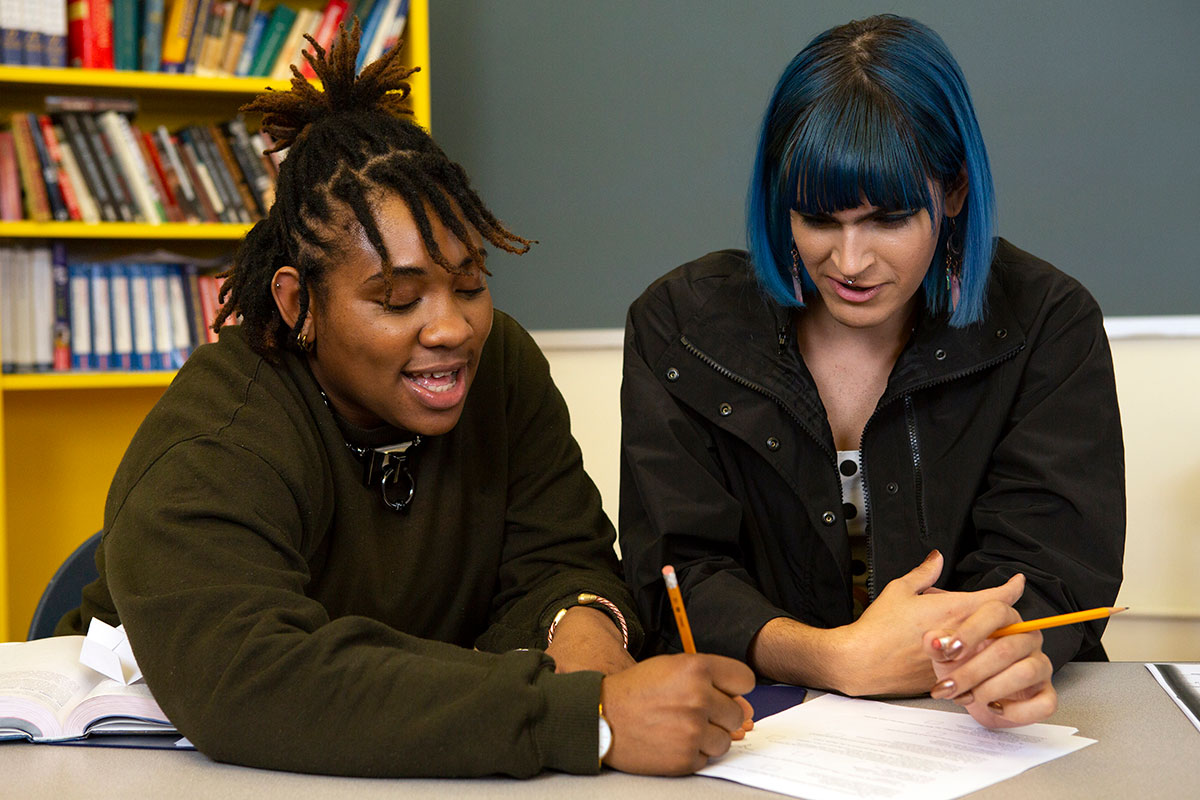
Two non-binary-students doing-work together in class. // Photo from The Gender Spectrum Collection / Zackary Drucker
Signs of improvement, but further work needed to create more inclusive secondary schools: 2SLGBTQ report
New research shows that, while there have been some important improvements in the last decade, there is still a long way to go in creating safer and more accepting Canadian schools for Two Spirit, Lesbian, Gay, Bisexual, Trans, Queer, Questioning (2SLGBTQ) youths.
Released by Egale Canada on June 10, the Still in Every Class in Every School report was created in partnership with researchers from the University of Winnipeg and the University of Manitoba. Tracey Peter, professor of sociology and criminology, Faculty of Arts, at UM and acting academic director for the Centre for Social Science Research and Policy, is the principal investigator.
Researchers heard from more than 4,000 students in Grades 8 through 12 across Canada in a survey about their experiences with homophobia, biphobia, transphobia, harassment, mental health and sense of safety and support at school.
The report found that 2SLGBTQ students are still much more likely to be bullied or harassed than their cisgender and heterosexual (non-2SLGBTQ) peers, and they are less likely to feel safe at school.
Still in Every Class in Every School follows on a national survey from a decade ago, which formed the basis for the 2011 report Every Class in Every School. It was the first of its kind to show how prevalent discrimination was in Canadian secondary schools at the time.
The new report found that 42 per cent of 2SLGBTQ students had been verbally harassed based on their sexual orientation (compared with 51 per cent in 2011) and 47 per cent had been verbally harassed based on their gender expression (compared with 57 per cent in 2011).
“The results can be summarized using the classic analogy of the glass being half empty or half full,” says Peter.
“If you take the approach that the glass is half full, the big take away is that when there is leadership in the form of anti-homophobia and anti-transphobia policies and when educators make a sincere effort to make their school a safe, diverse, and inclusive space for 2SLGBTQ+ students, these efforts translate into providing positive experiences,” says Peter.
While there has been improvement since 2011, researchers say the numbers are still far too high.
Some key findings from the new report include:
- 64 per cent of all participants reported hearing homophobic comments daily or weekly at school.
- 19 per cent reported hearing slurs against trans people daily or weekly at school.
- 30 per cent of 2SLGBTQ respondents had been the victims of cyberbullying, compared to 8 per cent of cisgender heterosexual respondents.
- 77 per cent of 2SLGBTQ Indigenous students had been harassed at school in the year leading up to the survey, the highest percentage of any group.
- 79 per cent of trans students who had been the victims of physical harassment reported that teachers and staff were ineffective in addressing transphobic harassment.
The report includes several recommendations, including ensuring that schools promptly and effectively respond to 2SLGBTQ harassment and discrimination and implement clear reporting systems. It also suggests a need to ensure resource support is provided to assist schools in the implementation of 2SLGBTQ-inclusive curricula.
The report recommends that government, policymakers, educators and the broader community have key roles to play in creating safer and more accepting schools for all.
“The results from this research have inspired me even more to continue being an advocate for all schools to be safe spaces that are both inclusive and expansive for 2SLGBTQ+ students. The results from this project give me renewed hope,” adds Peter.
Co-investigators for Still in Every Class in Every School are Christopher Campbell, a PhD candidate in the Faculty of Education at UM, and Catherine Taylor, professor in the Faculty of Education and department of rhetoric, writing & communications at the University of Winnipeg.
The full report is accessible online. Resources and tools for educators, parents and students are available from Egale.






